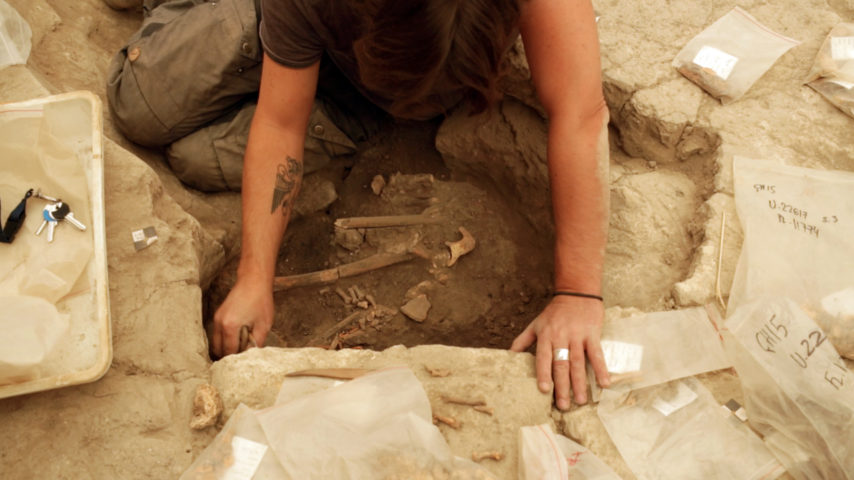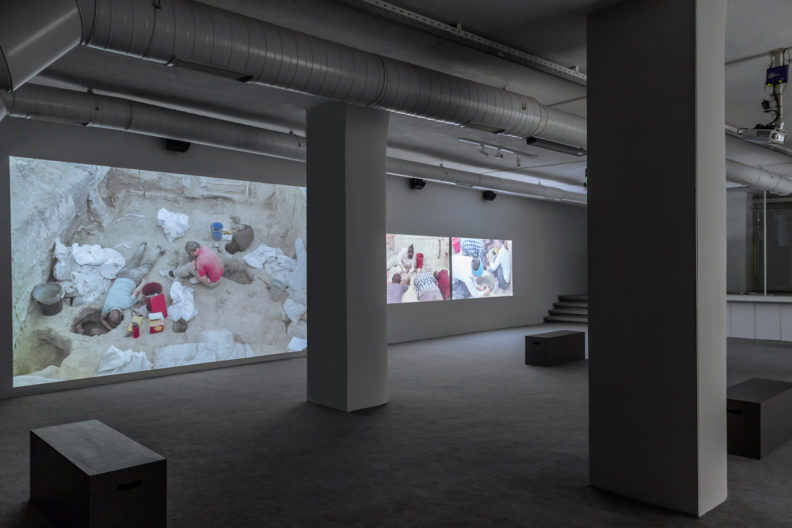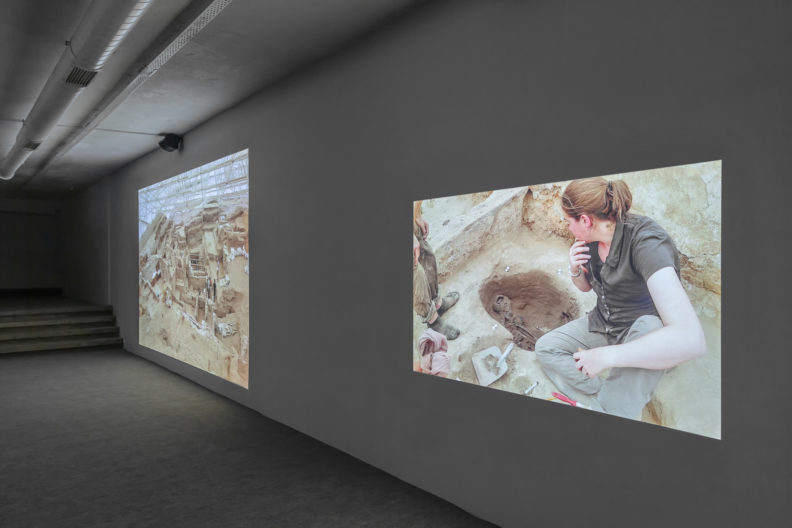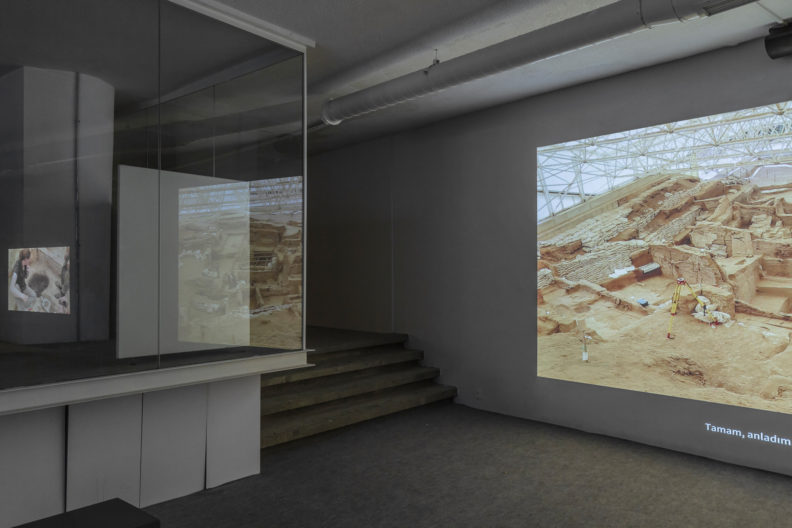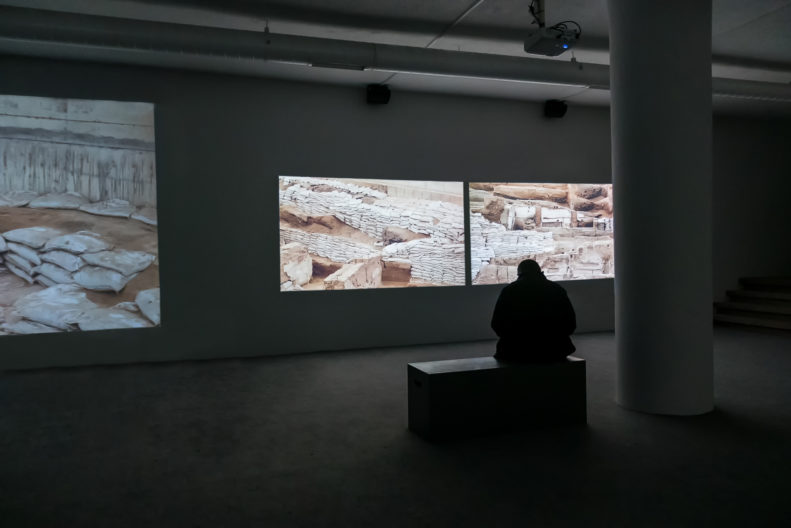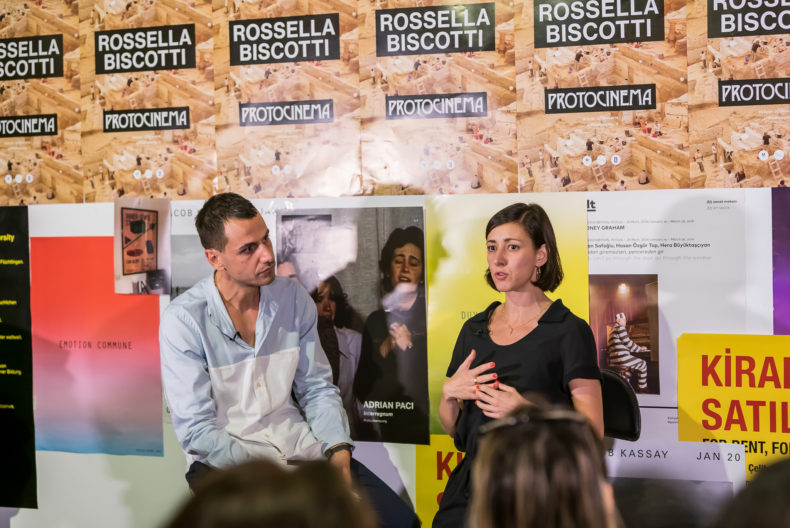ROSSELLA BISCOTTI
The City
Rossella Biscotti - Press Images w Credit Line, The City, Protocinema - here
Friday, September 28:
18:00 - PUBLIC CONVERSATION, Rossella Biscotti
19:00 - 21:00 pm – Opening Reception
Exhibition dates: September 28 – October 27, 2018
Hours: Wed. – Sat, 12:00 – 6:00 pm
Sıraselviler Cad. No. 35, Beyoğlu İstanbul
at Taksim Square
Protocinema presents Rossella Biscotti’s new five-channel video installation, The City, 2018, in a subterranean space in Istanbul. The City visits Çatalhöyük, a 9,000-year-old neolithic archeological site, recognized as the earliest urban development, to reflect on the society that is being dug up, and the society that is doing the digging.
Rossella Biscotti captured two excavation seasons, of the twenty-five year dig of Çatalhöyük archeological site in Konya, Turkey, overseen by archaeologist Ian Hodder, leader of the Çatalhöyük Research Project and Professor of Social Anthropology at Stanford University, and a member of the Post-Processual school of archaeologists. Biscotti expands on Hodder’s philosophy that the “aim of Western archaeologists, if they are to avoid inadvertently oppressing poorer ethnic groups, ought to empower the members of such groups to conduct their own research into their past.” [1]. Empowerment becomes a line, as conversations occur regarding current events at that time, and the potential socio-economic impact of these events. The first narrative of Biscotti’s installation looks at the present, how an emergent international living-community comes together, forming a network of relationships between specialists, excavators, academics and local staff as professional knowledge mingles with personal living-histories. Biscotti allows the archeologists’ questions to move throughout the site, creating a thread between their modern voices and the ancient buildings they are unearthing.
The parallel narrative of The City, also looks at the past, by way of ‘ontologies’ of specific archeological objects. Biscotti’s camera follows the journey of a given object, how it is handled, decontextualized from its location and re-contextualized within an archaeological narrative: from excavation pit, to lab, to archive, and so forth. The process of this removal gives way to an emotional distance from both societies, the dead and the living, to a third possibility that opens up perceptions of time; to a potential future, by way of a subtle shift from documentary to fiction, marked by a silence of conversations. “From here on there are no words.”[2] Over the duration of this fifty minute video, we, the viewers, are in the present, alongside the diggers. Towards the end of this immersion, we are suggested to be part of the past, watching a future excavation of the present. Biscotti’s images create an atmosphere where the viewer is led from the details of the excavation’s techniques and materiality, to the archeologists’ theories on the societal structures of the ancient civilization, and aims to result in a questioning of the formation of ideologies and relationships within contemporary society.
1. "Universalism And Particularism In Archaeological Theory Sociology Essay." UKessays.com. 11 2013. All Answers Ltd. 12 2015
2. Rossella Biscotti and Ines Goldbach, Director, Kunsthaus Baselland
Special Thanks to: Prof. Ian Hodder, Catalhoyuk Research Project, Stanford University Stanford Archaeology Center; Mondriaan Fund; Kunsthaus Baselland, Ines Goldbach; Italian Cultural Institute, Istanbul, Dr. Gianni Vinciguerra; SAHA Association Research Award and Independent Curators International (ICI) to Mari Spirito and Övül Durmuşoğlu for Ancient Works/Asar-ı Atika, at The Museum of Anatolian Civilizations, Ankara, Turkey, out of which The City evolved; Ghaith Mofeed; Max Mosca; Attila Faravelli; Elif Temizkan; Bengü Gün, Hamit Hamutçu, Mixer, Istanbul; SPOT Contemporary Art Projects; Rossella Biscotti is represented by Wilfried Lentz Gallery, Rotterdam and mor charpentier, Paris.
Rossella Biscotti was born in 1978 in Molfetta, Italy. For the past decade she has been living and working between the Netherlands and her research sites. Biscotti is currently in residency at the Artists-in-Berlin Programme, DAAD, Berlin (2018). Selected Solo Exhibitions: Kunsthaus Baselland , Basel (2018); V-A-C Foundation at Gulag Museum, Moscow (2016), Museion, Bozen (2015), Haus Lange and Haus Esters, Krefeld, WIELS, Brussels and Sculpture Center, New York (2014) e-flux, New York and Secession, Vienna (2013), and CAC, Vilnius (2012). Selected group exhibitions: Contour Biennial 8, Mechelen, Moderna Museet, Stockholm and Stedelijk Museum, Amsterdam (2017), Swiss Institute in New York and Van Abbemuseum, Eindhoven (2016), Irish Museum of Modern Art, Dublin (2015), ICA London (2014), MAXXI, Rome, Witte de With, Rotterdam and Museu Serralves, Porto (2010). Biscotti has taken part in major international exhibitions including the 55th Venice Biennale and the 13th Istanbul Biennale (2013), dOCUMENTA 13 (2012) and Manifesta 9 (2012).
